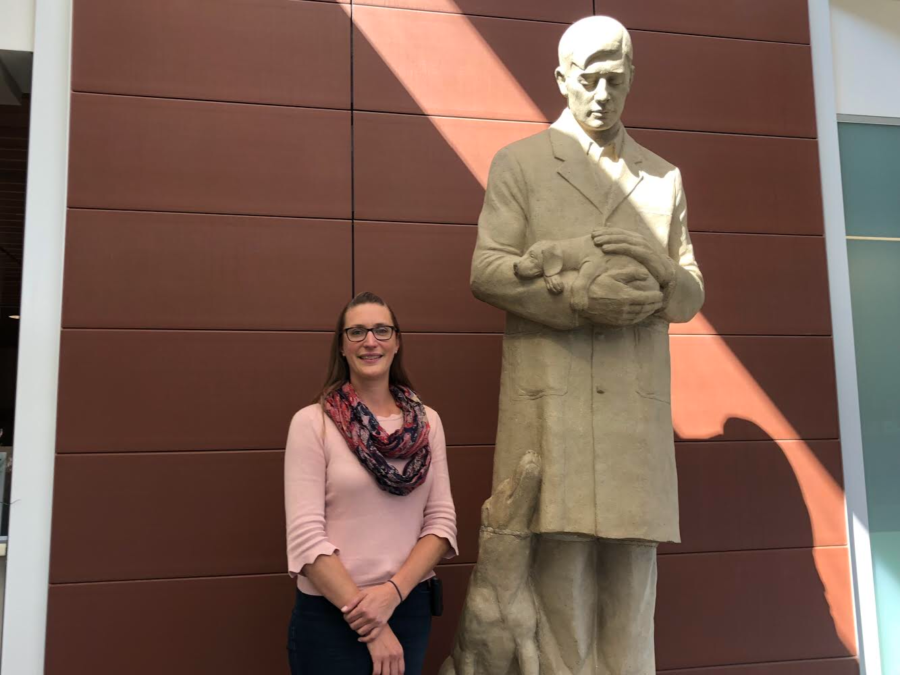Professor creates cardiology course and leads VetMed residents
Quinn Vandenberg/ Iowa State Daily
Jessica Ward, assistant professor in the veterinary clinical sciences department with a specialty in cardiology, stands next to the The Gentle Doctor sculpture.
October 6, 2019
Jessica Ward, assistant professor in the veterinary clinical sciences department, specializes in cardiology and has provided classroom and practical instruction on cardiology at the Hixson-Lied Small Animal Hospital.
Ward has worked with students, residents and certified veterinarians since she began her career in Iowa State’s College of Veterinary Medicine in Sept. 2015.
In 2018 Ward received the College of Veterinary Medicine’s Early Achievement in Teaching Award, and in 2019 Ward received the Iowa State University Award for Early Achievement in Teaching.
For third year students in the College of Veterinary Medicine, Ward created the course Veterinary Clinical Sciences 403, Clinical Cardiology II. The course has been offered at Iowa State for three years now.
Ward said in the past two years, the course has enrolled around sixty students each spring semester, approximately double the amount of students enrolled in the course the first time it was offered.
“The reason I started the course is to expose students to more of cardiology than what’s possible to do in the very limited number of class sessions that we have during the third year,” Ward said. “You only get 11 hours to teach them all of cardiology, so this allows me to have an additional 16 hours to teach them about the diseases that are maybe not the one, two, three most common but the four, five, six, seven next most common.”
Clinical Cardiology II is an elective pass or fail course taken by third year veterinary students, and it works to create research on how to best educate veterinary students in a small group setting.
Ward said the clinical cardiology course aims to promote discussion and look at problem solving through case-based learning.
Veterinary students complete three years of primarily classroom-based learning and then transition into practical clinical rotations in their fourth year.
Ward said two weeks of additional elective cardiology training have been added to clinical rotations for fourth year students. Approximately 115 to 120 of the college’s 160 fourth year students receive this training.
“Students are getting all the experience of working with the owner, taking the case history, doing a physical examination and interpreting all of the test results,” Ward said. “So if they were in general practice and saw a patient […] they would know what to do with it and they know when to send it to a specialist for further care.”
Ward also leads residents working to specialize in cardiology. One way residents receive cardiology training is through minimally invasive interventional cardiology procedures.
“These are minimally invasive cardiac procedures that allow us to fix heart problems by accessing the heart through a vessel somewhere else in the body,” Ward said. “Very similar to what’s done in humans, where if you have a heart attack, and they need to open up a blockage, they’ll put catheters through your wrist or your groin to access the heart.”
Ward said primarily all minimally invasive cardiac procedures performed at the Hixson-Lied Small Animal Hospital are done to fix congenital heart defects in dogs.
Ward said these procedures had not been performed in Iowa in five to six years and the college now performs around 20 procedures each year with a doctoral staff currently consisting of Melissa Tropf, clinical assistant professor in the veterinary clinical sciences department, and two cardiology residents.
One of the residents, Allison Masters, obtained her bachelor’s degree in biology and animal science in 2014 at Iowa State. She then graduated from Iowa State’s College of Veterinary Medicine in 2018.
Ward said after a rotating internship in small animal medicine and surgery at Colorado State University, Masters returned to the College of Veterinary Medicine at Iowa State and began her three year residency to specialize in cardiology under the continued mentorship of Ward.
Masters said she decided to go into cardiology for several reasons, with one of the biggest reasons being her mentor, Ward.
“I always had a proclivity for cardiology,” Masters said. “It was my favorite subject during our first year physiology courses and in our anatomy courses, but then when I met [Ward], she started introducing me to some of the more clinical aspects of cardiology and even invited me to participate in some of her research projects. I just knew that it’s what I wanted to do.”
One of the first research projects Masters worked on with Ward involved studying the effects of steroids to treat illness in cats and dogs.
“There’s been a general understanding that steroids are hard on the cardiovascular system, and so veterinarians are generally pretty hesitant to use them in patients that have underlying heart disease,” Masters said.
Masters said their work was focused on exploring different hypotheses as to why steroids can potentially be hard on the cardiovascular system. For the research, they focused on dogs to see if the potential effects actually happen.
Masters said she wishes to pass on the experience and expertise gained from the veterinary program to students throughout her residency, similar to what Ward has done.
“I think […] the biggest thing that I love and the most rewarding part of my job is actually getting to work now with veterinary students themselves and to give them the tools to feel more comfortable with cardiology cases as they go out to private practice and graduate and move forward in their career as well,” Masters said.
In addition to Ward’s work with the cardiology department, she also advises two student organizations: Student American Veterinary Medical Association and the American Association of Feline Practitioners.







